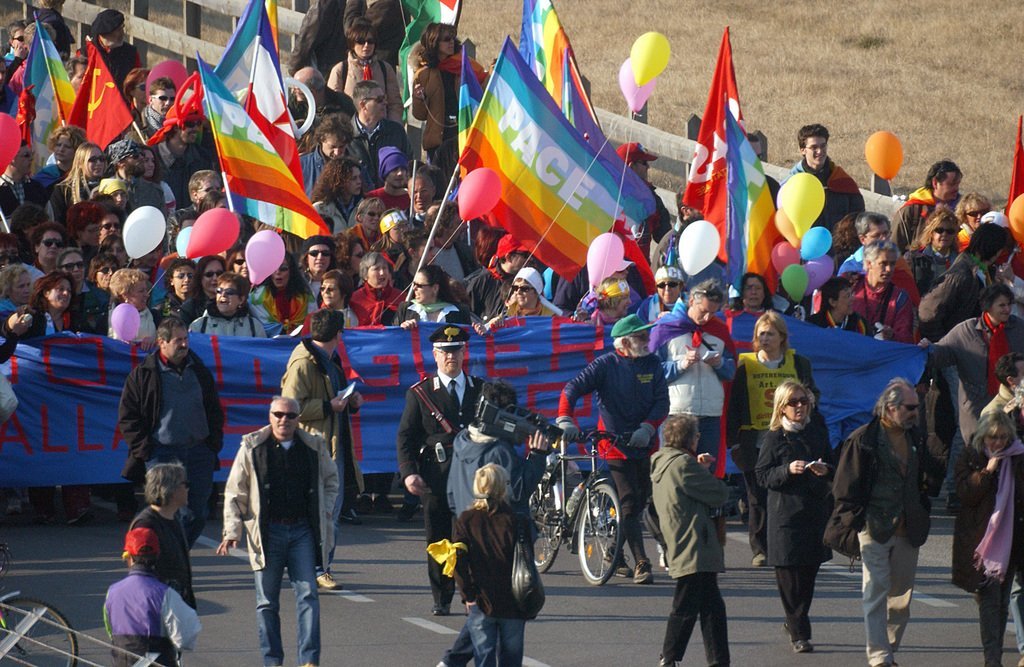ITALY: New government’s directive to ban protests in shopping areas or historic centres
In the light of the numerous anti-Covid-19 measures demonstrations and the complaints made by traders’ associations of huge income losses and fears of a “Christmas without shopping” because of rallies, on 11 November the Italian Minister for the Interior Luciana Lamorgese issued a directive to limit public protests in shopping areas or historic centres. The text invites prefects and mayors to lay down specific requirements for the holding of pre-announced demonstrations – ordering them, for example, to be held in static form or to follow suitable routes, with the intent “to preserve key urban areas”.
Many Italian CSOs and activists expressed deep concern on this curbing to the right to assembly in the country, that – despite what most of the national press said – will affect not only “Covid green pass protests”, but protests of all kind.
The LGBT+ and fat queer activist Elisa Manici, for example, pointed out:
“Thank you very much, dear State, for this other disgusting blow to our freedom. For those who have a hard time understanding: everything is forbidden, not only the no green pass demonstrations. If this doesn’t change, there will be no Trans freedom march on 20th, nor the national demonstration of Not One Less on 27th. At most there will be sit-ins, otherwise if there is an unauthorised demonstration it will be dispersed. It seems that hope is hanging by a thread, namely that the rule leaves a minimum of manoeuvre flexibility to individual prefects.”
The association of legal experts Giuristi Democratici defined the government’s directive as “an alarming call for the restriction of the exercise of the right of assembly and expression of thought“, as granted by Article 17 and 21 of the Italian Constitution:
“We note with concern that, by the means of a ‘directive’, or circular, the Ministry of the Interior wishes to give a political indication to the prefects and the police authorities to apply a restrictive interpretation of a legislation riddled with repressive, and often demagogic, interpretations of the delicate concept of public order […] The object of these regulatory interventions is an alleged danger to public security and is identified now in immigration, now in domestic and international terrorism, now in social conflict.”
On the contrary, Giuristi Democratici believed that, if marches take place in full compliance with Covid-19 health measures, it is not “constitutionally plausible for abstract, ex ante, reasons of health prevention to justify stringent limitations on meetings in public places, which have already been the subject of excessive and unjustified restrictions and repressive provisions in recent years.“
As explained by Cesare Antetomaso, lawyer and member of the national executive board of Giuristi Democratici interviewed by Osservatorio Repressione, the “Lamorgese directive is anti-democratic”:
“At a first reading, the directive seems to contain a series of common sense, almost good parenting recommendations. Keep your distance, wear a mask and a woollen shirt. However, the directive goes much further, and foreshadows a clampdown on freedom and the possibility of holding meetings and expressing one’s thoughts outdoors. A closer look reveals there is a continuous reference to a whole tradition of legislation, some of which has already been constitutionally censured and some of which has not. These are all laws that we have opposed over time: the Maroni package, the Minniti-Orlando decrees and, of course, those signed by Salvini. A series of recommendations linked to common sense and the rules on distancing to avoid crowding city centres has thus become a pretext for driving people away from their historic centres and making events a pointless parade in less populated places. We are faced with a stranglehold, an authoritarian twist that we cannot bear.”
In an open letter published on the press on 12 November, ARCI, Libera Contro Le Mafie, Legambiente and other CSOs called out the Lamorgese directive as a “serious attack on democracy, at a time when the spaces for debate and listening by institutions have already been severely curtailed, particularly during the acute phase of the pandemic.“

